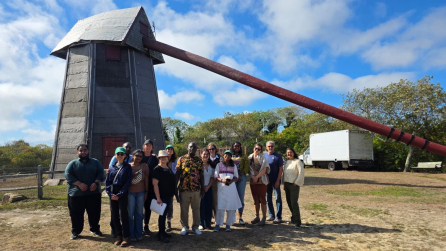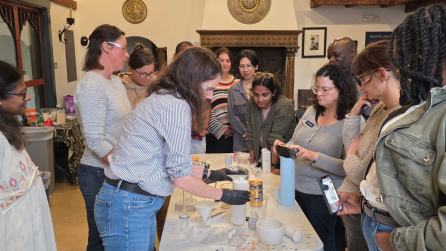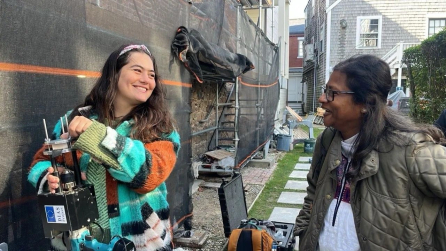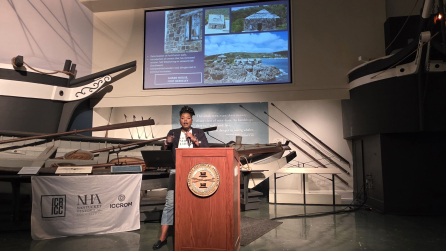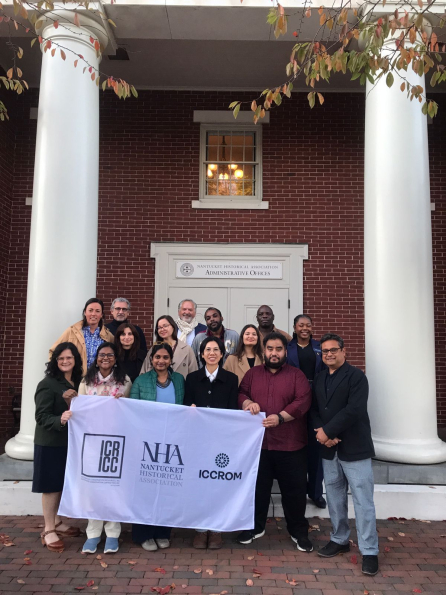The 2025 International Training Course on Reducing Risks and Increasing Resilience for Sustainable Built Heritage Conservation and Management has successfully concluded, marking the completion of a four-week programme that united 11 heritage professionals from around the world in a shared mission to advance climate action for cultural heritage.
Organized by ICCROM in collaboration with the Nantucket Historical Association (NHA) and Integrated Conservation Resources/Integrated Conservation Contracting (ICR-ICC), the course provided an immersive experience combining lectures, fieldwork, expert exchanges, and collaborative project work.
Hosted on the island of Nantucket, the training offered participants a unique opportunity to study real-world examples of heritage at risk from climate change while developing actionable strategies to safeguard it.
A comprehensive four-week journey
The course began with an introduction to Nantucket’s historic context, architecture, and conservation challenges, setting the foundation for understanding how built heritage is impacted by changing environmental conditions. Participants explored the island’s distinctive urban fabric, guided by experts from ICR-ICC and the NHA, and engaged in discussions on heritage management, risk preparedness, and climate adaptation frameworks.
In the second week, participants conducted material and condition surveys of selected heritage buildings in downtown Nantucket. Working in small groups, they documented existing deterioration, assessed structural vulnerabilities, and analyzed the effects of humidity, moisture, and other environmental factors. ICR-ICC specialists introduced diagnostic tools, including destructive and non-destructive testing methods, alongside GIS-based assessments to map patterns of visible decay and environmental stressors. This hands-on work laid the groundwork for developing informed conservation and monitoring plans.
The third week represented a pivotal shift from assessment to climate risk analysis. Under the guidance of a climate scientist, participants explored the fundamentals of climate science and modelling, from global projections to local applications. Through interactive sessions, they learned to link hazards, exposure, and vulnerability using cause-and-effect methodologies and developed climate risk statements for their case studies. A special session on Lifecycle Analysis for Prioritizing Climate Action: Applications to the Cultural Sector emphasized how sustainability principles can guide conservation decisions throughout a project’s lifespan, from materials selection to long-term maintenance.
From learning to action
The final week of the course fostered rich exchanges linking climate action, disaster risk management, and community engagement. Participants explored strategies for integrating adaptation and preparedness into heritage management frameworks, supported by expert insights on governance, financing, and local collaboration.
The programme culminated with final presentations, in which each group showcased their own case study projects from their respective countries, developed as part of the course. These projects illustrated how heritage professionals can transform scientific data and risk assessments into practical, context-specific strategies for strengthening the resilience of historic sites.
A highlight of the closing week was an online exchange with the ITC 2024 cohort, promoting dialogue and collaboration across ICCROM’s growing community of practice on climate action for heritage.
Building global capacity for resilient heritage
With the successful completion of this year’s course, 11 new professionals have joined ICCROM’s expanding network of ITC alumni, contributing to a global effort to integrate climate science, conservation practice, and community engagement for risk-informed, sustainable heritage management.
This initiative reflects ICCROM’s commitment to building international capacity for climate-resilient cultural heritage, empowering professionals to safeguard the world’s shared heritage against the impacts of climate change.
Congratulations to all participants and partners for their dedication and contributions toward a more resilient and sustainable future for our built heritage.

